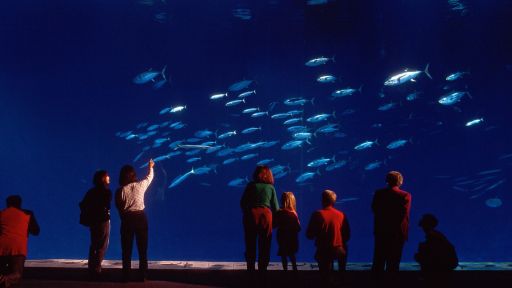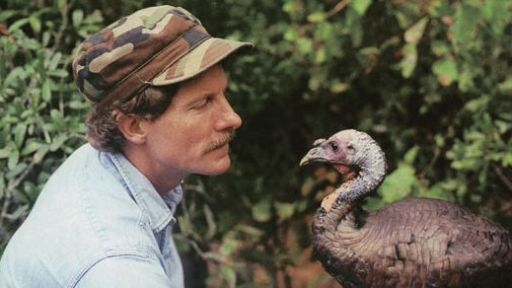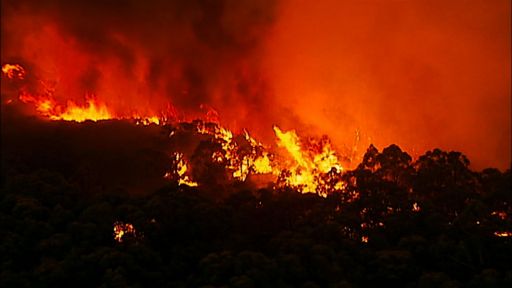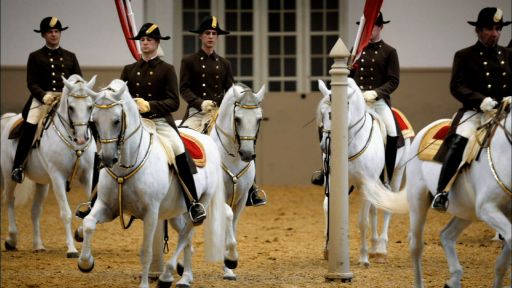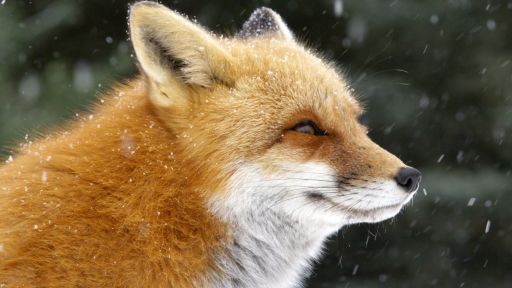Serengeti Stories
Uncover the variety of activity, both human and natural, that occurs on the slopes of active volcanoes. See the surprising number of animals that survive and thrive alongside these fiery natural phenomena
[dramatic music] - [Narrator] There are images we never tire of, stories that never grow old.
This is the magic of Africa.
[dramatic music] One man has made it his life's work to share with us Africa's timeless tales.
To reveal the unguarded secrets of animal's lives with wonder and imagination.
[dramatic music] For 30 years he has lived and worked in Tanzania, exploring the vast and beautiful wilderness of the Serengeti Plains.
His name is Hugo van Lawick.
- [Hugo] The Serengeti is my favorite place, it has enormous variety of sceneries, enormous variety of animals, the most extraordinary light, which changes all the time, so it's always changing.
And I think one of the extraordinary things here is, you can, you're sitting somewhere with an animal that maybe asleep, in the meantime you can look around, there are other animals, there's always something happening.
[dramatic music] - [Narrator] But the years and now failing health have taken their toll.
After 3 decades in the Serengeti, Hugo is breaking camp.
It's the end of an era.
This camp has been a celebrated place.
Every wildlife cameraman knows of it.
Many have come here to study their craft.
For Hugo van Lawick is a legend.
As a filmmaker, he is master of both the shot and the story.
His signature is an unforgettable image and a story so compelling that we know fear, joy, sorrow and triumph from the heart of the Serengeti.
[dramatic music] [dramatic music] This program is made possible by coNtributions to your PBS station from viewers like you, thank you.
[dramatic music] The cheetah, portrait of a predator.
All high speed action and difficult camerawork.
The cheetah is one of Hugo van Lawick's favorite subjects and he keeps his camera on them long after the hunt is over.
This is how he enters their personal world to take a fascinating look at how they treat each other.
We discover heroes and villains in a society we didn't know existed.
One of these great stories features cheetah twins and a pending show down with a gang of three young males.
It's called The Blood Brothers.
- About halfway through the film, that I felt this could become rather like a spaghetti western, cause I'd had these encounters before, but I thought the real payoff has to be if the three blood brothers meet the twins and then it really will be a spaghetti western and luckily that happened.
I was actually sitting with the three brothers, the blood brothers and made myself a cup of coffee and took my first sip, to my amazement they seemed to have moved and they were behind me.
then I suddenly realized, it was the twins, the brother and the sister, so I quickly threw my cup of coffee out of the window, raced around, got my camera all set up and then the blood brothers saw them.
- [Narrator] The male twin sees them first.
He knows his life is in danger and creeps towards his sister, but there is no where to run and they're younger, weaker and outnumbered.
[dramatic music] On the short grass plains, high noon is approaching.
[dramatic music] - [Hugo] The extraordinary thing is, these three males coming towards the camera.
All their movements were at the same time so they trot and at the same time they start walking and then they trot again.
[dramatic music] The brothers go straight for the male, who rushes to his sister's side.
[dramatic music] They mean business, while two stay at his rear, one goes for the male twins throat.
[cheetahs chirping] Inexplicably they break off and transfer their attention to the frightened female.
But they do not attack her.
[cheetah chirping] Perhaps because the twins are still young and the female is not in heat, the three brothers relent with only a last glance, as if to remind them, we'll be back.
The twins are left shaken and scared but unhurt, finding comfort together.
[dramatic music] - [Narrator] Hugo was born in 1937.
His father, a Dutch Navy pilot, had brought the family to Indonesia, but he was killed in a plane crash just before the outbreak of World War II.
With the Netherlands occupied by Germany, the family fled to England where Hugo started school.
It was here as a small boy, that he discovered a passion for wildlife.
- For as long as I can remember, I was interested in animals and then when I was 14 or 15 I went on a trip with some friends to a national park in Holland and I was the best one in being able to creep on my tummy up to the animals, so they used to press the camera in my hands and say try and get a shot and then I suddenly hit on the idea, this is the way I could work with animals.
I came to Africa in 1959 and planning to stay two years, and then to travel around the world, filming where ever, but I liked it so much here, I thought, no, I'm going to stay in Africa.
- [Narrator] As a young cameraman in Africa, Hugo soon caught the attention of anthropologist Louis Leakey.
Leakey had another protege in Tanzania whose startling discoveries he wanted to record.
And so Hugo came to Gombe, his assignment, to capture some controversial animal behavior on film.
Leakey's researcher was Jane Goodall, just beginning her groundbreaking work with chimpanzees.
- Hugo had this ability to understand the chimpanzees so well, after quite a short time, that he could predict their behavior and that's the secret of really good wildlife photography, being able to predict, so that you can get the camera in the right place ready and running.
- [Narrator] Hugo's work soon became essential to Jane's research.
- She didn't have a degree, she didn't have an official training in animal behavior and some of the scientists didn't quite believe what she was saying, the things she discovered, her interpretation of them.
- [Narrator] Jane Goodall was claiming that chimps made and used tools, that they hunted together for meat.
These assertions were revolutionary.
Other scientists needed to see it to believe it.
- Now for instance the tool making and using, the meat eating, because one of the top scientists always said that apes don't eat meat.
Now this was filmed and so the proof was there, he couldn't contradict this and so the filming was tremendously important to her scientifically.
- [Narrator] The partnership between Jane and Hugo deepened, and in 1964 they were married.
[dramatic music] Soon they began a family.
Hugo Jr, nicknamed Grub, was born into a life in the wild.
He accompanied his adventurous parents to every far flung location.
- Well, Hugo and I wanted to continue working in the field and I'd certainly learned from the chimpanzees, the tremendous importance of the bond between mother and child.
And of course, it's good to have a father around as well.
Grub's front yard was the vast Serengeti.
Hugo and Jane had begun a series of studies on the predators of the plains.
They turned their attention to the Serengeti's wild dogs.
As they watched, an amazing story began to unfold that became one of Hugo's most remarkable films.
[dramatic music] - One of my favorites, was my first one, which was called The Wild Dogs of Africa, it was about a wild dog called Solo.
Now one of the reasons that it caused a stir, was because until then, the general public had come to believe that among humans horrible things happened and out in the wild among animals, it was all nice and it was paradise.
And of course that's not true.
Among animals also nasty things happen and this was one of the first films or probably the first film, that really showed that.
It was a very dramatic film.
- [Narrator] Little Solo is the lone survivor of a litter of wild dog puppies.
Her story is both heartbreaking and heroic as she struggles to find a place in the pack.
The film reveals the dark side of life in the wild.
For all of Solo's brothers and sisters have been killed by her mother's rival, the dominant female, Havoc.
The pack can only mange to feed one litter of pups, and Havoc wants her own to survive.
- Solo has everything, it has what really happened in the wild.
It shows that you know, I don't think anybody who's ever seen the shot of the dominant bitch, Havoc, creeping towards the den of her rival.
Nobody will ever forget that, it was like evil, it really was.
[dramatic music] - [Narrator] As Angel desperately searches for leftovers from Havoc's pups, Havoc nears the unprotected den.
[dramatic music] Another of Angel's pups is taken and killed.
[dramatic music] And another.
[dramatic music] - [Narrator] This time Angel was too late.
We suddenly realized the puppy was still alive.
Then Havoc carried it down to her own den.
Angel heard her puppies' cries.
As Havoc emerged, Angel hesitated.
- Some of the general public felt I should have intervened in this violence, that was taking place, quite apart from that, I shouldn't have shown it.
But at least, I should have intervened and stopped it happening and of course you can't intervene, you must let nature take its course.
- [Narrator] Now the survival of the entire pack depends on finding food, they can no longer afford to be delayed by Solo, as always trailing behind.
[dramatic music] - [Hugo] The dominant female now decided to start moving away from the den, which meant they were traveling ten miles a day and it was four weeks too early for Solo, who was born later and Solo just couldn't keep up and finally the pack deserted Solo.
- [Narrator] As the pack recedes from view, Solo quickens her pace and calls.
[Solo calling] [dramatic music] But the dogs have reached the Gal Mountains and cannot hear her.
She is alone and lost.
[dramatic music] - [Narrator] In the end, Hugo could not just stand by.
He brought Solo back to camp, with the idea of introducing her into a new pack.
- I could have got kicked out of The National Park for doing that, but because wild dogs were already endangered at that stage, an exception was made for this, because I planned to return it to the wild as soon as I could.
But that I think is the only time I've intervened in the wild.
- [Jane] Would the dogs accept the strange puppy or kill it?
We had to know before releasing her, what the dog's reaction to Solo meant.
Then Lotus' curiosity seemed to override her fear.
Solo was making submissive gestures.
Did she sense that Lotus might harm her?
We had to make a decision quickly.
We decided to risk it.
The door was open, but Solo retreated to the back of the cage, we wondered if she sensed danger.
[suspenseful music] We held our breath, what happened now would be our responsibility.
Solo was accepted.
[dramatic music] - [Narrator] The years passed.
Grub was growing up.
Jane pursued her studies in animal behavior and Hugo continued producing films, but their marriage did not survive the strain of two famous careers.
Yet Hugo carried on his work at Gombe, filming the family saga of the chimps he had introduced to audiences around the world.
[dramatic music] He began the project when Fifi was just a baby.
Twenty years later she was a matriarch, the head of her family.
The complex story of those twenty years and the profound relationships in chimpanzee society is called People of the Forest.
- [Narrator] Fifi remained in her vine, she didn't bother to greet anyone.
And to ignore protocol was unwise.
Fifi was quick to make amends.
She knew the old male could be placated with a little kiss.
Now that everything had calmed down, Fifi could again turn her attention to her baby brother, Flint.
Figan seemed bored, he probably wanted to join the adult males, who to re-establish bonds of friendship had started to groom each other.
Grooming helped calm everybody down.
Flo was grooming Fifi, maybe to distract her attention from Flint.
Figan seemed to resent the attention his sister was getting from their mother, but he was pretty adapt in diverting attention to himself.
[dramatic music] Figan usually got what he wanted.
- The chimps have become so popular, because everybody knows Flo, everybody knows Fifi.
I was in South Korea the other day, just walking along the streets in Seoul and a young woman came up and said, are you Jane Goodall, she burst into tears and then she said, is Fifi still alive?
I mean, you know in the middle of South Korea, it's extraordinary.
Hugo's films have really made the chimpanzees known all around the world.
- [Narrator] And in revealing an unimagined depth of love and pain, People of the Forest is a masterpiece.
- [Narrator] Fifi heard Flint crying, he was over eight years old and still a baby, yet his cries were now well founded.
Flo was dead.
[dramatic music] Flint was distraught as he inspected his mother's body.
[dramatic music] He brushed the flies off her.
[dramatic music] Finally Flint lay down close to his mother.
[dramatic music] Flint climbed a tree, in which to make a nest, just above the stream.
Soon the whole family gathered.
[dramatic music] Friends began to drift away, but Flint did not move from his nest.
[dramatic music] Flint stayed near his mother's body for three weeks.
He died of grief.
[dramatic music] - [Hugo] One of my weaknesses in filming and still photography was scenery.
I wasn't good at photographing sceneries and knew if I ever started filming in 35 mm, which is what I desperately wanted to do, sceneries would be absolutely vital.
I set myself the task, it has to be beautiful scenery, beautiful light and the animal has to be doing something and that's an almost impossible task.
To get the combination of these three things, all working at the same time.
I spent two years photographing animals and sceneries and through that, learned what you need in a landscape to make it work.
[dramatic music] - [Narrator] Every life belongs in a particular setting and this is true of Hugo's life as well.
As he spent ever more time in the field, he found himself camping again and again in one special place.
It had trees and was close to water.
It offered all the comforts of home.
By 1971, Hugo had established a permanent base here on the high ground above Lake Ndutu.
It's rustic, but almost self-sufficient.
There's a kitchen, dining room, living and sleeping quarters, a library, even screening facilities.
Not far away, the lake attracts almost every kind of animal.
It's a perfect set up for filming.
[dramatic music] A complete machine shop is needed to maintain all the vehicles and equipment.
The nearest outside help is some 200 miles away.
[dramatic music] Surrounded by the wild, Ndutu Camp is a small village of 30 people, all working together in a joint enterprise.
There are cooks, and cameramen, carpenters and sound recordists.
[dramatic music] [people chattering] [dramatic music] For everyone who lives here, the rains are the key to survival and a cause for celebration.
- Okay, go, go, go.
Aswin, Aswin, go, go, go, go, yes, yes.
[people chattering] - [Narrator] Ndutu Camp and the Serengeti are a world unto themselves, completely contained in a great sweep of landscape and an unpredictable sky.
Yet they seem to hold everything that really matters.
- [Mascha] other side, yeah.
- [Narrator] It's the story of how life fits into this place, how all the elements of the Serengeti work together, that Hugo turned to next.
Instead of an intimate look at individual lives, it was epic.
He called it Race for Life.
- [Narrator] It is June now and the tropical sun beats down unrelentingly.
The earth has become extremely dry.
But an Eden lies just ahead.
A paradise.
A place shared by many.
[dramatic music] An oasis amid of turmoil, the Grumeti River is a year round source of water on which the migration can count.
[dramatic music] [water splashing] But here too, lies a foe, beyond compare.
Giant crocodiles have made this river their home.
- [Hugo] Mbaraka, can you go and check the lions please?
- [Narrator] Race for Life offered Hugo everything a filmmaker dreams of.
Great characters in danger and a quest, all set in motion by the elements themselves.
But Hugo somehow manages an extra bit of magic.
Even for those who know the Serengeti well, there is something unexpected, a twist in the story, a surprise.
- [Narrator] Renowned for their superb hunting skills, wild dogs will almost always bring down their prey.
Although on the Serengeti, nothing is certain.
This remarkable sequence captures a rare turn of events.
The female and the calf are first separated from the herd.
[dramatic music] The pack is determined to get at the calf.
[dramatic music] Unable to outrun the dogs, the two turn and face their attackers.
The calf fights to stay close to its mother, the only defense, while she does her best to hold off the pack.
For a moment, it appears that the struggle will soon be over.
[dramatic music] Wild dogs are known to easily bring down larger prey, and such difficulty with a small animal is unexpected.
[dramatic music] For nearly half an hour the unrelenting onslaught continues.
[dramatic music] Until finally, the exhausted dogs call off the attack.
The laws of nature are at times unpredictable.
And here on the plains of the Serengeti, a mother wildebeest and her week old calf, almost certainly doomed to die, have now become victorious.
[dramatic music] And for the wild dogs there may be no food tonight, but there is sure to be another hunt tomorrow.
- [Narrator] Like every artist, Hugo is always reaching for more.
A bigger story, a wider canvas, a deeper experience for his audience.
Short of taking you there himself, he hopes to pack as much of the Serengeti as he can into every frame.
[dramatic music] To achieve this more intense experience, he needs a bigger camera, and to go with it, a bigger screen.
[dramatic music] At long last, Hugo has realized his dream of filming Africa in 35 millimeter.
This larger format changes the framing of every shot and the feeling of everything you see.
Rich with greater texture and detail, his images are more stunning than ever.
In 35 millimeter, Hugo set out on his most ambitious project yet.
A feature film documentary on the wildlife of the Serengeti.
It had never been done before.
Of course, he needed a story, something exceptional.
And there was one animal that had always held a particular fascination.
Elusive, well camouflaged, and exceedingly difficult to film.
[dramatic music] The leopard.
A 35 millimeter camera is a big piece of equipment and these days, Hugo needs some help in setting it up.
Masha Bouwens is studying Hugo's techniques, training for the opportunity to shoot films of her own.
With the camera ready to go, Hugo steps in.
He's been tracking a young leopard for weeks for his theatrical feature The Leopard Son.
But before he shoots a single frame, there must be as Hugo puts it a beautiful landscape, beautiful light, and the animals must be doing something interesting.
[dramatic music] - [Narrator] What was it about giraffes, plainly they were too big to hunt, but it was fun to make them jump.
[dramatic music] This looks like a game, but it's so much more.
It's about determination and persistence.
It's learning how the world works.
[dramatic music] - [Narrator] Over the years, many aspiring young filmmakers have apprenticed with Hugo.
Ndutu Camp has been a second home to them and the starting place of quite a few promising careers.
- And I'll see you in Arusha very shortly, over.
- Thank you very much, see you soon.
- [Narrator] Matt Aebehard came to film in the Serengeti at Hugo's special invitation.
[dramatic music] Sophie Buck, now an award winning cinematographer, followed her heart to Africa.
And it wasn't until she was already here, that she discovered a hidden talent and a whole new way of life.
[people chattering] Wildlife films apply the art of storytelling to a deep understanding of the natural world.
- Hugo mentioned that the grass is flaring where they are.
Or is that?
- [Narrator] Films need writers and editors of course, but they all start with camerawork.
- Hugo has taught me mostly about light.
I think Hugo uses light in a very specific way.
It's painting and I've very much learned that from him and also because I drove him for a number of months, you learn how to position your car in relation to the animals and that's what I got from him.
I really wanted to come to Africa, because I'd seen, this sounds a bit corny, but I'd seen a picture of a tree, which is called The Tree where man was born.
Aswin, Aswin, do you read?
Yeah, doing fine Aswin, I was wondering, have you seen the hippo's this morning?
I loved wildlife, but I wasn't a sort of any particular interest, it was something that's developed here.
And I came and I worked in a lodge for a couple of years and then I went home and finally I managed to make Hugo give me a job.
I worked as a camp manager for about the first year and here I am sort of six years later operating a camera, which is fantastic.
- [Narrator] Matt and Sophie have teamed up on Hugo's latest film.
- Okay, they're all yours.
- Thank you Matt.
No it's cool.
- [Matt] Look at that.
- They're not looking very savage are they?
- [Matt] I have always been quite a keen naturalist.
I've always been interested in wildlife and I did want to work with animals and I consider myself to be reasonably artistic, so frankly wildlife photography has been the perfect career for me.
I was an assistant editor and we got on very well and when I was looking for work, six months later he invited me out for Africa, so that was a dream come true.
- [Narrator] And it was Matt behind the 35 millimeter camera who was on hand for this extraordinary scene from The Leopard Son.
[dramatic music] Two lionesses are out for the kill but their prey leads them into territory so treacherous, it could claim all their lives.
[dramatic music] The mud of a drying river is a mortal trap.
If the lions don't make good their own escape, it may be fossil hunters, ages from now, who uncover their bones.
[dramatic music] - [Narrator] This is predation with a huge risk.
I've seen mud under the crust reach down more than ten feet, deep enough to swallow a Land Rover.
[dramatic music] It's a fossil bed in the making.
[dramatic music] - What do you think of that?
- [Sophie] Nice.
- Nice, is that all?
It's excellent.
- [Narrator] Back at Ndutu Camp, the tents are coming down.
Hugo has finally decided it's time to leave the Serengeti.
- This evening is going to be my last night at Ndutu Camp after thirty years, which is a bit dramatic, but on the other hand I've got a lot of exciting things in front of me to do.
But I'll have dinner with the Tanzanian staff and the crew, staff and crew together, to thank them and say good-bye to some of them.
Others I'll see back in Arusha, because they've done a superb job for me.
[dramatic music] [people chattering] [dramatic music] - [Narrator] It's an evening of both celebration and sadness.
Friendship and farewell.
[people chattering] so much has been shared in this place, so many new adventures, so many old stories.
- Out in West Africa we have people building a house.
They were Muslim and they would pray to Allah.
And there was a little baby chimpanzee and he saw them and then he did the same.
[group laughs] [dramatic music] It's gonna be very difficult to imagine what it'll be like flying off tomorrow, and presumably we'll circle camp and that's the last time we'll see it.
And that is, it'll be a very strange feeling.
A very strange feeling.
[dramatic music] I will certainly come back and visit here, hopefully more than once.
And then I will certainly check this spot, probably sit here and look at the birds or whatever and also check that the vegetation has recovered and that traces of camp have disappeared.
- [Narrator] They will leave no trace of camp, but Hugo is not through with Africa yet.
He will still live in Tanzania.
And from a new home in the town of Arusha, he plans to continue working as long as he can.
For there are still more stories to tell, more of Africa to share with the world.
[dramatic music] With everything packed up at last, it's time to go.
Friends gather at the makeshift air strip to say goodbye and to wish Hugo safe journey.
[people chattering] Some have known Hugo for decades, they know what it means to him to leave his Serengeti home.
- Theo, take care.
- Take care.
- See you in Arusha.
- Same to you, good flight.
- Thanks.
[people chattering] - [Narrator] See you in Arusha has become the refrain.
A turning toward the future.
- See you in Arusha.
- See you in Arusha.
Take care.
- Take care.
[people chattering] - Whoops, now how do we get into this?
You'll have to help me with this.
- No problem.
- I think it's for someone a bit thinner than me.
[engine rumbling] [dramatic music] - [Narrator] With a final wave, he is gone but far below, the Serengeti remains.
[dramatic music] A new generation has taken up the camera, continuing the work that Hugo began so long ago.
- His films and photographs have really made a difference in changing people's perception about the true nature of wild animals and he should feel very, very proud of that.
[dramatic music] - [Narrator] Hugo van Lawick has found meaning in the profound events of animal lives, and between the mysteries of birth and death, he has given us stories that will live forever.
[dramatic music] - [Narrator] This program was made possible by contributions to your PBS station from viewers like you, thank you.
[dramatic music] [dramatic chord]
You May Also Like
